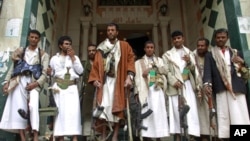Forces loyal to Yemeni leader Ali Abdullah Saleh and top tribal leader Sheikh Sadiq al-Ahmar are observing a truce made late Friday, as tribal mediators try to put an end to recent fighting which broke out this week. Meanwhile, in Syria, security forces fired on anti-government protesters in a number of cities, killing at least eight people.
Yemeni tribal leaders appear to have thrown down the gauntlet against embattled President Ali Abdallah Saleh, attacking two military bases on Friday belonging to the powerful Presidential Guard. The Presidential Guard is controlled by Mr. Saleh’s son Ahmed, and is his main base of support.
The Yemeni Air Force later intervened, according to witnesses, bombing the tribal forces besieging the Fardha Nehem base, 80 kilometers north of the capital Sana'a. Pan-Arab television also reports that tribal forces in the province of Jouf have also laid siege to another Republican Guard base.
In Sana'a and at least a dozen other towns and cities, thousands of protesters continued to demonstrate against Mr. Saleh, amid a lull in fighting between the president’s loyalists and tribal forces. Al-Ahmar said that he was observing a truce, as tribal leaders mediate in the conflict.
At a funeral for around 30 of his men killed in the recent fighting, al-Ahmar told mourners that if Mr. Saleh “wants a peaceful revolution, we are ready for that. If not, we will fight him.”
But Deputy Information Minister Abdou Jundi, an ally of Mr. Saleh, insisted that al-Ahmar’s forces tried to take several government ministries, provoking the conflict:
He says that al-Ahmar’s forces seized several government ministries and used every caliber of weaponry to do so. He adds that al-Ahmar's men also tried to take the interior and defense ministries, in addition to capturing the Yemeni news agency.
Al-Ahmar’s press spokesman Abdel Qawi al Qeissi disputed the claim, insisting that it was Mr. Saleh’s forces that began the fighting by trying to take an empty school near al-Ahmar’s family compound:
He claims that the school was in neutral territory but that suddenly Mr. Saleh's side tried to take it, at which point al-Ahmar's forces tried to stop them and shooting began.
Skirmishes continued during the day Friday inside Sana'a between Mr. Saleh’s forces and those of al-Ahmar. Fighting later Friday was reported as sporadic and light.
Bitter fighting broke out between both sides on Monday, 24 hours after President Saleh refused to sign a Gulf plan that would have forced him to step down in 30 days. The President accused opposition parties of refusing to attend a signing ceremony at the presidential palace.
Meanwhile in Syria, witnesses are reporting protests in at least a dozen towns and cities, including the capital Damascus and the second largest city of Aleppo.
Witnesses say pro-government militiamen and other security forces fired on crowds in Syria’s third largest city Homs, as well as in smaller cities near Daraa and Damascus.
Yemeni Tribal Leaders Pursue Cease-Fire, Lull in Fighting




